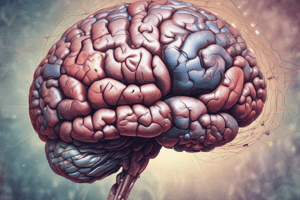Podcast
Questions and Answers
What type of brain tumor originates in the central nervous system and rarely metastasizes?
What type of brain tumor originates in the central nervous system and rarely metastasizes?
- Secondary
- Primary (correct)
- Malignant
- Benign
Malignant brain tumors are benign and do not pose life-threatening risks.
Malignant brain tumors are benign and do not pose life-threatening risks.
False (B)
Name one common symptom of brain tumors.
Name one common symptom of brain tumors.
headache
A brain tumor that originates from metastasis in other areas of the body, such as the lungs or kidneys, is classified as a __________ brain tumor.
A brain tumor that originates from metastasis in other areas of the body, such as the lungs or kidneys, is classified as a __________ brain tumor.
Which of the following complications is NOT associated with brain tumors?
Which of the following complications is NOT associated with brain tumors?
Match the following brain tumor locations with their associated symptoms:
Match the following brain tumor locations with their associated symptoms:
Which electrolyte imbalance should a nurse carefully monitor in a patient after a craniotomy for a brain tumor near the pituitary gland?
Which electrolyte imbalance should a nurse carefully monitor in a patient after a craniotomy for a brain tumor near the pituitary gland?
Pituitary dysfunction can occur as a complication of brain tumors.
Pituitary dysfunction can occur as a complication of brain tumors.
Flashcards
Brain Tumor Origin
Brain Tumor Origin
Brain tumors can be primary, originating in the CNS, or secondary, originating from metastasis from other parts of the body.
Brain Tumor Complications
Brain Tumor Complications
Complications include brain tissue inflammation, increased intracranial pressure (ICP), neurological deficits, pituitary dysfunction, and cerebral edema.
Brain Tumor Classification
Brain Tumor Classification
Brain tumors can be classified as benign (noncancerous), malignant, metastatic, supratentorial (above the tentorium), or infratentorial (below the tentorium).
Supratentorial Tumor Location
Supratentorial Tumor Location
Signup and view all the flashcards
Infratentorial Tumor Location
Infratentorial Tumor Location
Signup and view all the flashcards
Signs of a Brain Tumor
Signs of a Brain Tumor
Signup and view all the flashcards
Craniotomy and Electrolyte Imbalance
Craniotomy and Electrolyte Imbalance
Signup and view all the flashcards
Post-Craniotomy Monitoring
Post-Craniotomy Monitoring
Signup and view all the flashcards
Study Notes
Brain Tumors
- Primary tumors originate in the central nervous system (CNS) and rarely metastasize.
- Secondary tumors are from metastasis from other parts of the body (e.g., lung, breast, kidney).
- Complications include brain tissue inflammation, increased intracranial pressure (ICP), neurological deficits, pituitary dysfunction, and cerebral edema.
- Classification includes benign (non-cancerous) and malignant (cancerous) tumors.
- Supratentorial tumors are located above the tentorium cerebelli, potentially causing paralysis, seizures, memory loss, cognitive and language impairments, and visual problems.
- Infratentorial tumors are located below the tentorium, potentially causing ataxia, autonomic nervous system dysfunction (ANS), vomiting, drooling, hearing loss and vision impairment.
Assessment of Brain Tumor Patients
- Common symptoms include headaches, nausea and vomiting (N&V), seizures, altered sensory perception (numbness or tingling), balance problems, weakness or paralysis, difficulties with thinking, speaking, and changes in cognition or personality.
Interventions for Brain Tumor Patients
- Nonsurgical interventions include chemotherapy (e.g., lomustine, temozolomide, procarbazine, methotrexate) and radiation therapy (stereotactic radiosurgery).
- Tumor Treating Fields (TTFs) use electric fields to target the tumor.
- Surgical interventions include craniotomy.
Electrolyte Imbalance Monitoring After Craniotomy
- After a craniotomy near the pituitary gland, the nurse should carefully monitor for hyponatremia (low sodium levels).
Reporting Critical Findings After Craniotomy
- A decline in the level of consciousness is a critical finding requiring immediate reporting to the surgeon or rapid response team.
- Other findings like headaches, drainage of 25 mL in 8 hours, or periorbital edema are not immediate priorities compared to a change in level of consciousness.
Studying That Suits You
Use AI to generate personalized quizzes and flashcards to suit your learning preferences.




